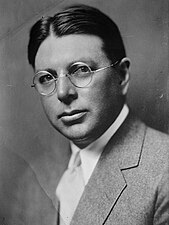Edwin Corning
| Edwin Corning | |
|---|---|
 |
|
| Lieutenant Governor of New York | |
|
In office January 1, 1927 – December 31, 1928 |
|
| Governor | Al Smith |
| Preceded by | Seymour Lowman |
| Succeeded by | Herbert H. Lehman |
| New York State Democratic Committee Chairman | |
|
In office January 1926 – August 1928 |
|
| Preceded by | Herbert C. Pell |
| Succeeded by | M. William Bray |
| Personal details | |
| Born |
September 30, 1883 Albany, New York |
| Died | August 7, 1934 (aged 50) Bar Harbor, Maine |
| Political party | Democratic |
| Spouse(s) | Louise Maxwell Corning |
| Relations |
Parker Corning (brother) Erastus Corning (grandfather) Amasa J. Parker (grandfather) |
| Children |
Erastus Corning 2nd Louise Corning Harriet Corning Edwin Corning, Jr. |
| Alma mater | Yale University |
| Profession | Business executive |
| Religion | Episcopal |
Edwin Corning (September 30, 1883 – August 7, 1934) was an American businessman and politician from New York. He was Lieutenant Governor of New York from 1927 to 1928.
Corning's father was Erastus Corning (1827–1897) and his paternal grandfather was Erastus Corning. His mother was Mary (Parker) Corning, the daughter of Amasa J. Parker. He was educated at The Albany Academy and the Groton School, and graduated from Yale University in 1906. He was an executive at the Ludlum Steel Company in Watervliet, New York, and became its President in 1910. He was also an officer of the Albany Felt Company, and served on the board of directors of several Albany banks. Corning was also a gentleman farmer, and bred prize winning horses, sheep and cows. In addition, he was a dog breeder, and became known for his champion Irish wolfhounds.
In the years immediately after World War I, Corning collaborated with Daniel P. O'Connell to create a Democratic organization in Albany that could wrest control of the city from the Republican organization run by William Barnes; their strategy was to run wealthy non-ethnic Protestants like Edwin Corning, William Stormont Hackett, Parker Corning, and Erastus Corning 2nd for major offices including mayor and Congressman to enhance the respectability and credibility of a Democratic organization run by working class Irish-American, Catholic figures like O'Connell. Corning became chairman of the Albany County Democratic Committee in 1912 and chairman of the county committee's executive committee in 1919. In the 1921 contest for mayor, the O'Connell/Corning organization succeeded in electing Hackett, the beginning of Democratic control of city hall that has remained in place ever since.
...
Wikipedia
